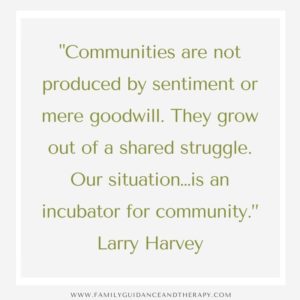The coronavirus is the first real collective experience that most of us have undergone in our lifetime.
The pandemic has led to loneliness and sadness through sickness, loss of life, economic hardship, and social distancing, but it has also produced a positive outcome in its wake, a powerful strengthening experience and opportunity in both our own selves and collectively in our communities.
Collective Experience Can Create Strong Communities
As humans, we often do not know how much we have until we lose it. In that respect, many of us did not feel an innate need for community in our day-to-day busy lives until we felt that we had lost it to the coronavirus.
Part of our ‘waking up to the need’ for each other occurred through social distancing and the wearing of masks.
Our facial expressions are covered by masks, which leaves us attempting to smile and acknowledge others through our eyes. As we step a distance away, to get into a six-foot space of safety, we feel a sense of detachment.
For those of us that are huggers, we are left with a craving for hugs like we have never experienced before.
We do not want to separate ourselves from others, we are social beings. We do not want to avoid people as if they have a disease, yet, that is what we are doing.
We want others to be warmed through our smile, our acknowledgment, and sometimes through touch. We want to evoke a sense of caring. Masks and social distancing hampers all of that.
Having trouble adjusting to life now? Here are our tips to adjusting to the new 'normal'
Stay-at-home measures and social distancing have also increased our need to hear each other’s stories. Even though our own need to share is important, we have emerged with a strengthened desire and purpose to ensure others are okay. This has bolstered a community and worldwide view to provide kindness and compassion wherever and however we can.
Our new-found need for each other—the need for togetherness, illustrates how multitudes of people are feeling. This is a shared experience.
Is this collective experience important? Yes, it can mold our lives for many years to come. It can help to create strength both in ourselves and our communities.
Renewed Awareness of Community
Before coronavirus disrupted our lives, we were literally not sharing anything collectively. We were sharing our individual life stories (i.e., through social media outlets and passing conversation), but we did not know what we were missing.
Now, and perhaps for the first time, we are beginning to know our neighbors and our community. Even after coronavirus disappears, there will be isolated people, but it will be different. We are and will continue to be aware.
Through the collective experience of coronavirus, we have developed and foundationally learned that the best way to get through a crisis is each other. Our eyes have opened to interdependence in both ourselves and our communities. We have learned that resilience is grown through mutuality. Community is strengthened in these new interrelationships.
As we continue with our renewed awareness and gratefulness in appreciating time together, with a combined concern about our own mental health and that of others, we build much stronger support systems. Related: Being Thankful
Our Role in Social Support
Strong social support in both our inner-circle and within our outlying community is one of the most important factors in our mental and emotional health. Have you heard the words, ‘You must take care of yourself so you can be here for others?’
Self-care includes taking care of ourselves both physically and mentally, including having trusted people in our lives that we can reach out to, as well as a system of information and support that we can dip into in time of need.
Reciprocally, this is the framework that we must follow to help others and strengthen our communities.
As we collectively grow in our current experiences, we can emerge from today’s crisis with a robust support system that will continue to shape our lives for years and decades to come.
We do not know when the coronavirus will go away, but as history has proven, we can come out of this stronger than we were going in.

